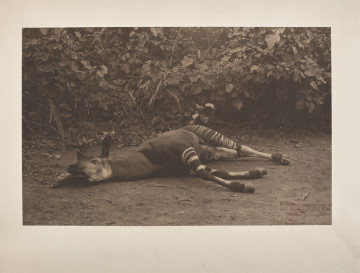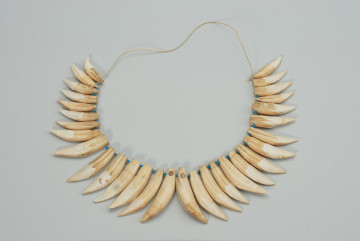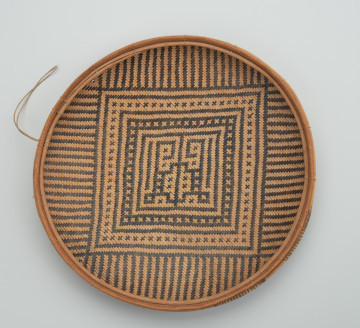
Okapi
1924
Castle Museum in Łańcut
Part of the collection: Crafts of the Amazon Indians
The braided product on display was used to catch and hold toxic treefrogs (Dendrobatidae), called kumarawa by Ye'kuan. The men used the poison found on the skin of these amphibians to poison the blowgun darts used for hunting. They also rubbed their arms with it, treating this treatment as a kind of hunting protection spell. The Ye'kuana Indians, traditionally inhabiting the Venezuelan states of Amazonas and Bolivar, were once considered the best hunters in the region. For many decades, they used blowguns for hunting arboreal animals and birds - hunting air weapons whose effectiveness was due to their noiselessness. Without frightening the game, they could hunt several animals from one herd in a relatively short period. Blowguns were also poisoned with a plant extract, commonly known as curare. The use of frog venom is an exceptional and rare occurrence. Ye'kuana go to the forest for kumarawa and catch them in a basket, which they then fuel over a campfire. The amphibians, sensing danger, produce venom. The Indians rub the arrows several times on the back of the frog and leave them to dry. After this whole process, the exhausted amphibians are released back into the forest. The most toxic of the treefrogs is the yellow treefrog (Phyllobates terribilis), which emits extremely strong poison equivalent to the king cobra's venom. In the wild, these amphibians pose no threat to humans. The only risk is if the poison passes through a wound into the blood or directly into the stomach. Meat from animals hunted with poisoned arrows is perfectly safe to eat.
Katarzyna Findlik-Gawron
Author / creator
Dimensions
cały obiekt: height: 42 cm, width: 23,5 cm
Object type
basket
Creation time / dating
Creation / finding place
Identification number
Location / status

1924
Castle Museum in Łańcut

około 1971
National Museum in Szczecin

około 1987
National Museum in Szczecin
DISCOVER this TOPIC
Castle Museum in Łańcut
DISCOVER this PATH
Educational path